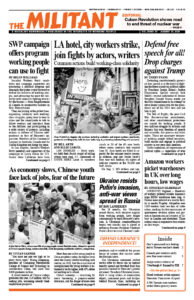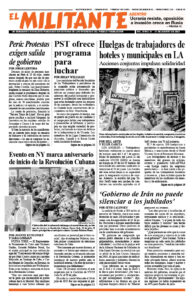NEW BRUNSWICK, N.J. — Seventeen hundred nurses, members of United Steelworkers Local 4-200, went on strike at Robert Wood Johnson University Hospital here Aug. 4 after three months of negotiations produced no new contract.
“This is not a step we take lightly, but we have reached a breaking point. We have to stand up for ourselves and our patients,” Local President Judy Danella told MyCentralJersey.com. The nurses are striking for the first time since a four-week strike in 2006.
Spirited picket lines went up at hospital entrances. Handmade placards like “Safety first, listen to your nurse, scabs don’t heal” and “Hey RWJ, love your nurses, not your purses” were held high alongside United Steelworkers signs.
Construction workers heading home for the day cheered the nurses. A UPS truck stopped and the driver shouted his encouragement. Passersby honked their horns.
“This is about people’s lives. In my unit we regularly have three patients per nurse — it should be two at most,” Nancy Lipschutz, a cardiac critical care nurse for 34 years and a picket captain, told the Militant.
Hospital spokesperson Wendy Gottsegen issued a statement Aug. 4 saying that “we offered to go to arbitration,” but the union rejected the offer. She claimed it is “among the highest staffed hospitals in the state.”
“Last contract we agreed to go to binding arbitration and ended up with a terrible contract,” noted Lipschutz. “What’s that saying? Fool me once shame on you. Fool me twice, shame on me! We won’t be fooled again.”
Elizabeth O’Donovan has been a pediatric emergency room nurse for 20 years. “We work for hours without taking a break. It isn’t unusual to start at 7 a.m. and not have a first break until 5 p.m.” She said that emergency admissions wait a long time on gurneys for a room. “Part of the problem is that housekeeping is low paid and short-staffed — rooms may be empty but not cleaned for a new patient.”
Robert Wood Johnson is one of only three Level 1 Trauma Centers in the state, meaning it treats the sickest patients in the region, often sent by other hospitals that can’t provide the same care.
The main issue in contract talks is staffing levels. Other issues include wages, retirement benefits, and capping health care costs. Lipschutz said that their health insurance is expensive and “the copay for an emergency room visit is $250!”
Two associate deans at the Rutgers University medical school affiliated with the hospital sent an email to students asking them to “volunteer” at the hospital during the strike. More than 370 students signed a petition in response saying that “respecting the rights of the striking nurses and their demands is essential to supporting the fight for fair working conditions” and patient safety. Rutgers faculty members who belong to the American Association of University Professors-American Federation of Teachers called the administration’s “anti-union behavior abhorrent and unacceptable.”
RWJBarnabas Health, which owns the hospital, has brought in highly paid strikebreakers from an agency that specializes in providing nurses during strikes, paying more than $17 million to the agency before the strike started. Nurses pointed out the fenced area where these replacement nurses are dropped off by buses for their shifts.
Sarah Caley, a nurse in the radiation department, has worked at the hospital for eight years. “Having the union is very important. The other nursing jobs I’ve had were all nonunion. Then they just pull the rug out from under you whenever they want,” she said. “At the core of the strike is patient safety. There’s been such a decrease in staffing levels in the time I’ve been here.”

